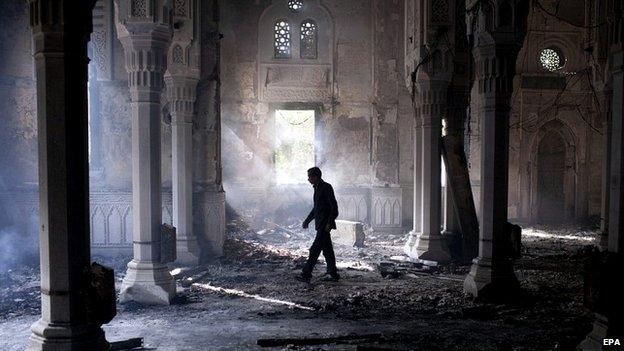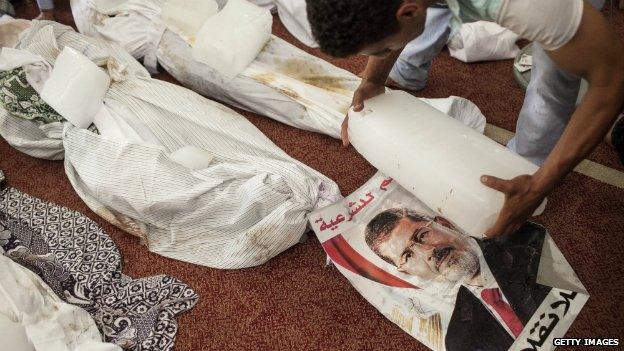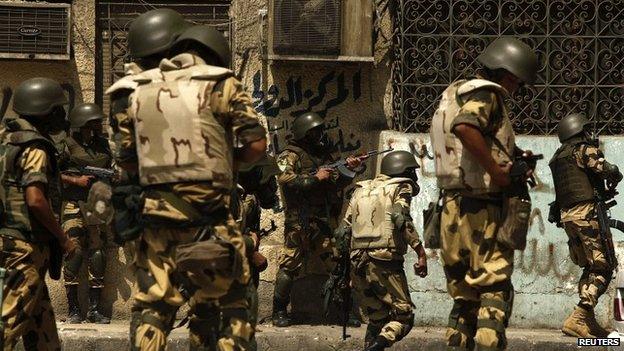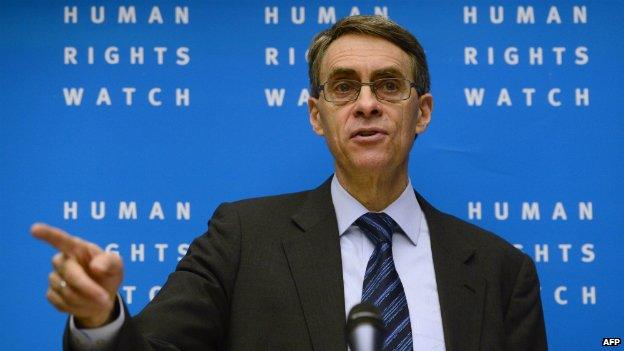Egyptian security forces 'planned massacre,' says HRW
- Published

Several hundred people died at Rabaa al-Adawiya mosque after security forces broke up a protest camp
The killings of at least 817 people by Egyptian security forces last year probably amount to a crime against humanity, Human Rights Watch says.
A report, external by the US-based group says 1,000 or more people probably died in one day around Rabaa al-Adawiya mosque.
The deaths came during demonstrations broken up by Egyptian security forces.
Executive director Kenneth Roth said the deaths were "one of the world's largest killings of demonstrators in a single day in recent history".
Mr Roth and a colleague were stopped from entering Egypt on Monday.
They were due to launch the new report at a press conference in the Egyptian capital, but were deported after being held for 12 hours at Cairo International Airport.
The group's year-long investigation focused on six demonstrations in July and August 2013 that were forcefully broken up by security forces, then under the command of now-President Abdul Fattah al-Sisi.
Mr Sisi, who was then a general running Egypt's military and was elected head of state in May 2014, oversaw the ousting of President Mohammed Morsi in July 2013.
In the aftermath his armed forces launched a brutal crackdown on Muslim Brotherhood supporters.

Human Rights Watch documented 817 of the deaths but says the total figure is likely at least 1,000

The report focuses on how security forces broke up six demonstrations in Cairo in July and August 2013

Egyptian press reaction
Egypt's state-owned and private media have largely ignored the Human Rights Watch (HRW) report, with state TV also making no mention of the barring of an HRW delegation from entering the country on 10 August.
However, the pro-Muslim Brotherhood Mikamilin TV carried captions from the news conference where the results of the report were announced.
The state and private press defended the ban on the HRW delegation, quoting the government's statement that "HRW has no legal status in Egypt". They also noted that the Egyptian government regarded the report as "biased" and "negative".
Meanwhile, social media users criticised the ban as unprecedented.
"Barring the HRW delegation from entering Egypt!!!! This is almost the first time in history that something like this happens!!!" Egyptian blogger Wael Abbas, external, who has more than 268,000 followers, tweeted.
Mina Fayek, external, who has some 5,400 followers, tweeted: "If you have a problem with the HRW's report then wait until they talk and then respond to them, but barring them weakened your position and made you look like a coward in front of the world."
Compiled by BBC Monitoring

HRW's report says Egyptian police and army "methodically opened fire with live ammunition on crowds" demonstrating against Mr Morsi's removal from power.
The clearing of the protest camp at Rabaa al-Adawiya mosque on 14 August 2013 followed "a plan that envisioned several thousand deaths," according to the report.
The rights group estimates that a minimum of 817 people died during the violence at the mosque but says the actual figure was more likely 1,000 or more.
"Given the widespread and systematic nature of these killings," the report adds, "these killings most likely amount to crimes against humanity."
Mr Roth said the actions were not "merely a case of excessive force or poor training."
"It was a violent crackdown planned at the highest levels of the Egyptian government," he said. "Many of the same officials are still in power in Egypt, and have a lot to answer for."

Mr Roth had hoped to discuss the report with the government but was barred from entering the country
At the time, the government congratulated the police and army for its actions and praised their "self-restraint".
It claimed that armed protesters had attacked security forces and that force had only been used in response to violence from demonstrators.
The government has not yet responded to the Human Rights Watch report or made any comment on its employees being denied entry to the country on Monday.
Sarah Leah Whitson, the head of HRW's Middle East and North Africa division, said airport officials told her and Mr Roth that they were being deported for "security reasons".
In a statement, HRW said it was the first time that Egyptian authorities had denied its staff members entry to the country, including during the rule of ex-President Hosni Mubarak.